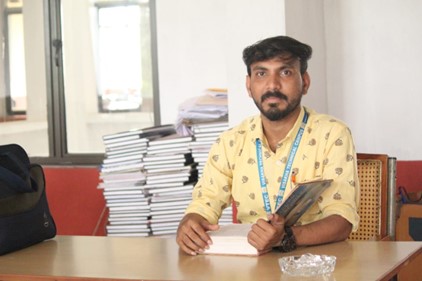COLLEGE CODE

Headlines
DIPLOMA IN Civil Engineering
About Civil Engineering
The department of Civil engineering of VIET was established in 2013 at the inception of the college. The Diploma program was started with an intake of 90 later decreased to 60 in 2022 . The department has state of the art advanced laboratories to cater the needs of students, research and consultancy. . The department takes pride in its highly experienced faculty specialized in all major specializations of Civil engineering. The Department of Civil Engineering contributes to ever growing need of building industry, service sector and community institute-industry interaction through the alumni
Vision
"Continuously for excellence in education To impart teaching and develop consultancy that serves the society and to strive continuously for excellence in education."
Mission
To provide a technically progressive academic environment.
To provide a technically progressive academic environment.
To develop personality, ethical values and entrepreneurial skills to face social challenges.
To develop personality, ethical values and entrepreneurial skills to face social challenges.
To contribute to the sustainable development in society.
To encourage continuous learning and self-development.
HoD

Mr K JAGAN
MTECH (PhD)
Further Studies
After completing the diploma, students can explore further studies and career advancement:
Bachelor's degree in Civil Engineering or related fields.
Specialized courses in structural design, project management, and sustainable construction.
Obtaining certifications in construction management and relevant software tools.
Career Opportunities
Graduates of a Diploma in Civil Engineering have diverse career opportunities in sectors such as:
Construction companies.
Infrastructure development projects.
Architectural and engineering consulting firms.
Government agencies and urban planning departments.
Faculty List

Faculty Name |
manasa2 |
Qualification |
phd |
Designation |
professor |
Experience |

Faculty Name |
MR PYLA PAVAN KUMAR |
Qualification |
B.Tech (M.Tech) |
Designation |
LECTURER |
Experience |
3 |

Faculty Name |
MS.BOTTA SAI PRIYA |
Qualification |
B.Tech (M.Tech) |
Designation |
LECTURER |
Experience |
1 |

Faculty Name |
MR TIRUMAREDDY CHAITANYA KRISHNA |
Qualification |
B.Tech |
Designation |
LECTURER |
Experience |
4 |

Faculty Name |
Mrs P SRAVANI |
Qualification |
B.Tech |
Designation |
Lecturer |
Experience |
1 |

Faculty Name |
MR. KUSUMANCHI JAGAN |
Qualification |
M.Tech (Ph.D) |
Designation |
HOD |
Experience |
7 |
Laboratories
1. Surveying
Surveying plays a vital role in every construction project. Every project commences and accomplish with surveying. Surveying laboratory is offered for undergraduate students to obtain practical knowledge on boundary, topographical surveys and setting out of works by hands-on training with wide variety of modern surveying equipment, such as UAV, DGPS, Total stations, Vernier theodolites and Automatic levels. Students can utilize the topographical information attained for capstone projects, such as highway design and land development. Student use of the lab is preceded by appropriate safety training and instruction on the use and care for the equipment.
2. Hydraulics
The purpose of this laboratory is not only to introduce practical knowledge to the student but also improve the technical way of writing report, communication skills and network. To achieve the basic objectives of a laboratory course work, active participation of students and teachers are vital. Before performing actually an experiment in the laboratory, students should acquire background knowledge of the experiment, method of analysis, interpretation of experimental results and practical significance of results. In addition students must aware of preparing a standard laboratory report for the given experiment. In engineering education, laboratory classes especially for under graduate students play a significant role in concreting their theoretical knowledge of fluid mechanics and machinery.
3. Geo-Technical Engineering
The Geotechnical Engineering Laboratory intends to train the students in the field of testing of soils to determine their physical, index and engineering properties. The Geotechnical engineering Laboratory is equipped with facilities to carry out many types of tests on soils. These include testing of a large range of sample sizes for compressibility, shear strength and drainage properties. A typical geotechnical engineering laboratory helps in identifying the engineering behavior of geo-materials and byproducts such as fly ash etc. This information is used by geotechnical engineer for designing the type of foundations, earthworks such as dams, embankments, tunnels, reservoirs, pavement subgrades, and specialized applications like waste containment systems. The preciseness of such design is entirely based on the experimental information obtained from a geotechnical laboratory. Therefore, geotechnical engineer
4. Transportation Engineering
Laboratory tests on materials such as tests on soils used in the fill and subgrade, the aggregates used in various pavement component layers and the bituminous binders and mixes used in top layers of flexible pavements. Some of the essential field tests to be carried out during construction of various component layers as a part of the quality control check and some field tests for structural and functional evaluation of pavements that are generally followed by the MORTH and IRC.
5. Material testing lab
The laboratory serves a wide spectrum of activities covering those related to teaching, research, development and consultancy. The primary activities include experimental studies on different types of materials which are using in concrete and testing of concrete specimens in various exposure conditions. This lab also offers technical services for testing and research on the structural behavior and properties of materials. The laboratory major equipment includes Compression Testing Machine, an Accelerated Curing Tank, a Workability measuring equipment, a Humidity Chamber, a vibrating table, a Muffle Furnace, a Cement Autoclave, and Concrete Mixer etc. Other sophisticated equipment to perform Non-destructive are also available and used extensively in various activities.
Gallery
PROJECT EXPO




SPORTS

CULTURALS

INDUSTRIAL VISITS


PLACEMENTS
EXAM SECTION
ALUMNI
PRINCIPAL, DIPLOMA COLLEGE, VIET

